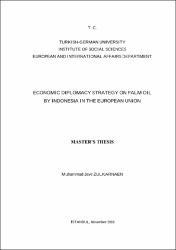| dc.contributor.advisor | Turhan, Ebru | |
| dc.contributor.author | Zulkarnaen, Muhammad Jave | |
| dc.date.accessioned | 2020-03-08T21:03:06Z | |
| dc.date.available | 2020-03-08T21:03:06Z | |
| dc.date.issued | 2019 | |
| dc.identifier.citation | Zulkarnaen, M. J. (2019). Economic diplomacy strategy on palm oil by Indonesia in the European Union. Türk-Alman Üniversitesi, Sosyal Bilimler Enstitüsü, İstanbul. | en_US |
| dc.identifier.uri | https://hdl.handle.net/20.500.12846/70 | |
| dc.description.abstract | Palm oil is used as a raw material in many industries such as foods, cosmetics, transportation fuels, and energy. Palm oil is one of the main contributors to the Indonesian economy. The industry creates millions of employments and improves the livelihoods of smallholder farmers. Indonesia exports palm oil to the European Union (EU)’s countries and market demand has increased steadily. However, the expansion of the palm oil plantation has received numerous criticisms of environmental and social issues from various international nongovernmental organizations (NGOs) and several European countries. Subsequently, the EU establishes the Renewable Energy Directive (RED) to regulate the policies of all renewable resources and limits the utilization of biofuel based on palm oil that does not provide standardization. The RED is considered a Non-Tariff policy has influenced strongly to the volume of palm oil export. To overcome this matter, Indonesia implements economic diplomacy strategy to deal with Non-Tariff policy by the EU. This research was conducted by applying qualitative methods that generate data from literature sources and several interviews. Therefore, this thesis examines the NonTariff policy and the effectiveness of the implementation of the economic diplomacy strategy by Indonesia on palm oil in the EU. | en_US |
| dc.description.abstract | Palm yağı; gıda, kozmetik, ulaşım yakıtları ve enerji gibi birçok endüstride hammadde olarak kullanılır. Palm yağı Endonezya ekonomisine ana katkıda bulunanlardan biridir. Endüstri milyonlarca istihdam yaratır ve küçük çiftçilerin geçim kaynaklarını iyileştirir. Endonezya, Avrupa Birliği (AB) ülkelerine palm yağı ihraç ediyor ve pazar talebi giderek arttı. Bununla birlikte, palm yağı plantasyonunun genişletilmesi, çeşitli uluslararası sivil toplum kuruluşlarından (STK'lar) ve birkaç Avrupa ülkesinden çevresel ve sosyal konularla ilgili çok sayıda eleştiriyi almıştır. Daha sonra, AB tüm yenilenebilir kaynakların politikalarını düzenlemek için Yenilenebilir Enerji Direktifini (RED) oluşturur ve standardizasyonu sağlamayan palm yağına dayalı biyoyakıt kullanımını sınırlar. RED, hurma yağı ihracatının hacmini büyük oranda etkileyen Tarife Dışı bir politika olarak kabul edilir. Bu sorunun üstesinden gelmek için Endonezya, AB Tarife Dışı politikalarıyla başa çıkmak için ekonomik bir diplomasi stratejisi uygular. Bu araştırma, literatür kaynaklarından ve çeşitli görüşmelerden veri üreten nitel yöntemler kullanılarak gerçekleştirilmiştir. Bu nedenle, bu tez, Tarife Dışı politikasını ve Endonezya tarafından ekonomik diplomasi stratejisinin uygulanmasının AB'deki hurma yağı üzerindeki etkinliğini incelemektedir. | en_US |
| dc.language.iso | eng | en_US |
| dc.publisher | Türk-Alman Üniversitesi | en_US |
| dc.rights | info:eu-repo/semantics/openAccess | en_US |
| dc.subject | Biyodizel | en_US |
| dc.subject | Yenilenebilir enerji politikası | en_US |
| dc.subject | Palm yağı | en_US |
| dc.subject | Endonezya | en_US |
| dc.subject | Avrupa Birliği | en_US |
| dc.subject | Europe Union | en_US |
| dc.subject | Europäische Union | en_US |
| dc.subject | Palm oil | en_US |
| dc.subject | Indonesia | en_US |
| dc.subject | Biodiesel | en_US |
| dc.subject | Renewable energy directive | en_US |
| dc.title | Economic diplomacy strategy on palm oil by Indonesia in the European Union | en_US |
| dc.type | masterThesis | en_US |
| dc.relation.publicationcategory | Tez | |
| dc.contributor.department | TAÜ, Sosyal Bilimler Enstitüsü, Avrupa ve Uluslararası İlişkiler Ana Bilim Dalı | en_US |
| dc.contributor.institutionauthor | Zulkarnaen, Muhammad Jave | en_US |

















